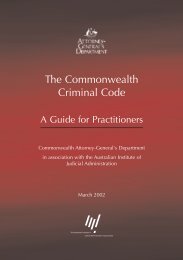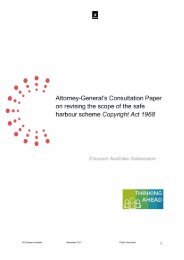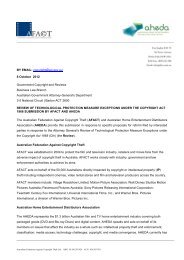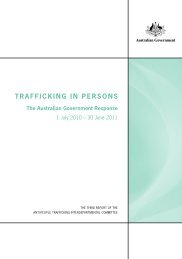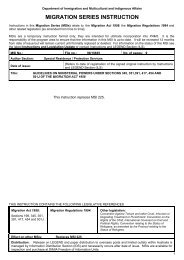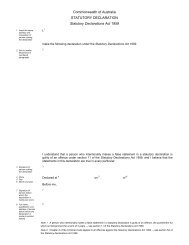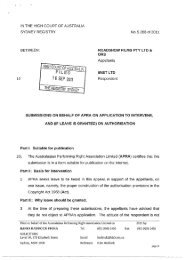Normann Witzleb [PDF 657KB] - Attorney-General's Department
Normann Witzleb [PDF 657KB] - Attorney-General's Department
Normann Witzleb [PDF 657KB] - Attorney-General's Department
You also want an ePaper? Increase the reach of your titles
YUMPU automatically turns print PDFs into web optimized ePapers that Google loves.
B. Responses to the Questions in the Issues Paper <br />
1 Yes.<br />
1. Do recent developments in technology mean that additional ways of<br />
protecting individuals’ privacy should be considered in Australia?<br />
2. Is there a need for a cause of action for serious invasion of privacy in<br />
Australia?<br />
2 Yes. Australian appellate courts continue to show little inclination to recognise a<br />
common law right to privacy. An invasion of privacy is therefore only actionable where a<br />
defendant can establish some other cause of action that applies incidentally. Three<br />
Australian law reform commissions concluded in as many years that this standard of<br />
protection is inadequate and recommended the introduction of a statutory cause of<br />
action.<br />
3 The reports of the Australian Law Reform Commission (2008), the New South Wales<br />
Law Reform Commission (2009) and the Victorian Law Reform Commission (2010)<br />
show a remarkable degree of consensus as to the main features of this proposed<br />
statutory cause of action. These features include that the privacy action should focus on<br />
intrusion into seclusion and misuse of personal information as the main forms of privacy<br />
complaints. Furthermore, the commissions were acutely aware that privacy will often<br />
conflict with legitimate interests of the defendant or the public at large, and therefore<br />
proposed robust mechanisms for withholding protection from plaintiffs unless the court<br />
is satisfied that the privacy interest outweighs countervailing interests. Under the<br />
proposals, a successful plaintiff can seek compensatory damages, injunctions and<br />
declarations as potential remedies, but not exemplary damages.<br />
4 The ALRC points out that its recommended cause of action ‘sets a high bar for<br />
plaintiffs, having due regard to the importance of freedom of expression and other rights<br />
and interests’. 1 Indeed, there are a number of areas in which the Australian law reform<br />
proposals for a cause of action against serious invasion of privacy fall short of the<br />
standard of protection now prevailing in the United Kingdom. There is no doubt that the<br />
strength of privacy protection in the UK over the last decade is largely owed to the fact<br />
that the Human Rights Act 1998 (UK) enshrines a guarantee of the right to respect for<br />
private life into domestic law. As there is no similar guarantee in domestic Australian<br />
law, it is particularly important that the cause of action provides a solid framework for<br />
privacy protection in this country.<br />
*<br />
This submission makes use of material I published in: <strong>Normann</strong> <strong>Witzleb</strong>, ‘A statutory cause of action for<br />
privacy? A critical appraisal of three recent Australian law reform proposals’ (2011) 19 Torts Law Journal<br />
104-134.<br />
1 See Australian Law Reform Commission, Press Release, available at http://www.alrc.gov.au/newsmedia/privacy/australia-must-rewrite-privacy-laws-information-age<br />
3


![Normann Witzleb [PDF 657KB] - Attorney-General's Department](https://img.yumpu.com/26247895/3/500x640/normann-witzleb-pdf-657kb-attorney-generals-department.jpg)

